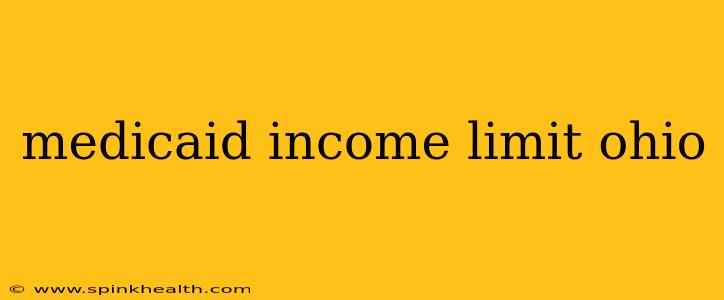The world of Medicaid can feel like a maze, especially when trying to understand eligibility requirements. This is particularly true in Ohio, where the income limits for Medicaid can vary depending on your family size, age, and other factors. Let's unravel the complexities and shed light on how Ohio determines Medicaid eligibility based on income. My aim is to provide you with a clear, comprehensive understanding, ensuring you're equipped with the knowledge to navigate this crucial process.
Imagine Sarah, a single mother of two in Columbus, Ohio. She's working hard but struggling to make ends meet. Understanding Ohio's Medicaid income limits could be the key to accessing vital healthcare for her and her children. Sarah's story, while fictional, highlights the very real challenges many Ohioans face in determining their eligibility for this critical program.
What are the Income Limits for Medicaid in Ohio?
This is the central question, and unfortunately, there isn't a single, simple answer. The income limits for Ohio Medicaid are determined by several factors, including:
- Family Size: The more people in your household, the higher the income limit. A family of four will have a significantly higher limit than a single individual.
- Age: Eligibility criteria can vary based on age, with specific programs designed for children, seniors, and those with disabilities.
- Disability Status: Individuals with disabilities often have different eligibility requirements than those without.
- Pregnancy: Pregnant women may qualify for Medicaid even if their income is slightly above the standard limit.
Because these factors are intertwined, it’s impossible to provide a single numerical figure. To find the exact income limits that apply to your specific situation, you'll need to utilize Ohio's official resources (details at the end).
How is My Income Calculated for Medicaid Eligibility in Ohio?
Ohio uses your Modified Adjusted Gross Income (MAGI) to determine Medicaid eligibility. MAGI is a calculation based on your tax return information and includes items like wages, salaries, self-employment income, and certain types of investment income. It's crucial to accurately report all income sources to ensure your application isn't delayed or denied. Failing to do so can have significant consequences.
What Types of Income Are Considered?
This is a key area to understand fully. Income sources considered for MAGI calculations typically include:
- Wages and Salaries: Your employment income.
- Self-Employment Income: Income from your own business.
- Investment Income: Interest, dividends, capital gains.
- Social Security Benefits: Certain types of Social Security income may be counted.
- Unemployment Benefits: Unemployment payments are usually considered income.
- Alimony and Child Support: These can affect eligibility, depending on the specific circumstances.
What Types of Income Are NOT Considered?
Certain income types are typically excluded from the MAGI calculation. These may include:
- Child Support Received: (This can be complex; consult Ohio's Medicaid website for specifics).
- Certain Public Assistance Benefits: (Specific exclusions apply; consult official sources for details).
How Can I Apply for Medicaid in Ohio?
The application process is best navigated through the official Ohio Medicaid website. They provide online applications, assist with the process, and can guide you through the requirements specific to your situation.
What Happens if My Income Exceeds the Limit?
If your income exceeds Ohio's Medicaid income limits, you may still qualify for assistance through other programs. Exploring options like the Affordable Care Act marketplace or other state-sponsored assistance programs could be necessary. It's vital to thoroughly investigate all available options.
Does Ohio Offer Medicaid for Pregnant Women?
Yes, Ohio's Medicaid program provides coverage for pregnant women, often with more lenient income limits than the standard program. Pregnant women should apply as soon as they confirm their pregnancy.
What Resources are Available to Help Me Understand Ohio Medicaid?
The best resource is the official Ohio Medicaid website. It offers a comprehensive guide, application portals, and contact information for assistance.
Remember, navigating the intricacies of Medicaid eligibility can be challenging. Don't hesitate to seek professional assistance if you need it. Understanding your options can make a significant difference in accessing necessary healthcare. Your health and well-being are paramount.

